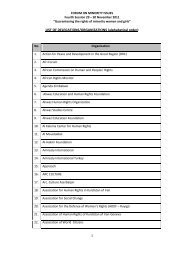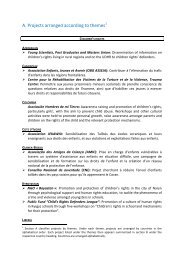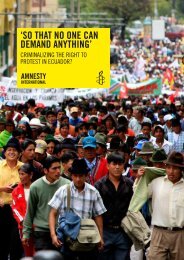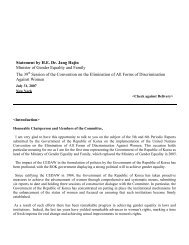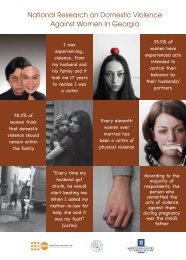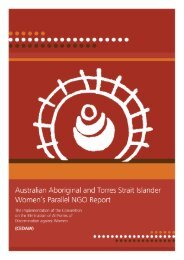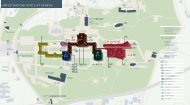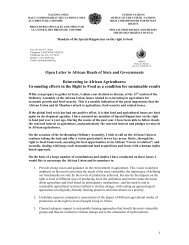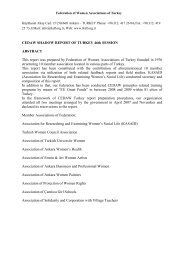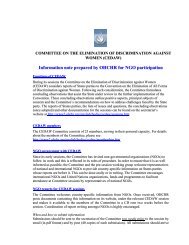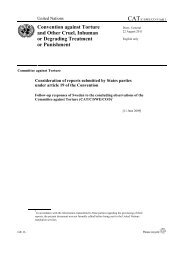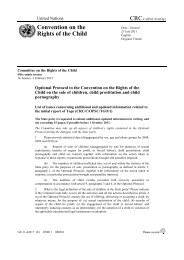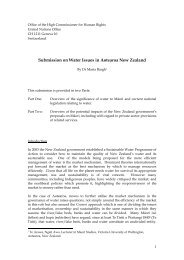Report - Office of the High Commissioner on Human Rights
Report - Office of the High Commissioner on Human Rights
Report - Office of the High Commissioner on Human Rights
- No tags were found...
You also want an ePaper? Increase the reach of your titles
YUMPU automatically turns print PDFs into web optimized ePapers that Google loves.
Testim<strong>on</strong>ies <strong>on</strong> Housing, Land and Property <strong>Rights</strong> <str<strong>on</strong>g>of</str<strong>on</strong>g> Women (Migrati<strong>on</strong>, Shift to<br />
Urban Areas, Urban Settlements)<br />
Presenters: Stella Simmering, Elizabeth T<strong>on</strong>gne, Reginald Kipe,<br />
Stella Simmering, Australia<br />
L<strong>on</strong>ggrass Associati<strong>on</strong> Testim<strong>on</strong>y <strong>on</strong> <str<strong>on</strong>g>the</str<strong>on</strong>g> right to adequate housing<br />
My name is Stella Simmering. I represent <str<strong>on</strong>g>the</str<strong>on</strong>g> L<strong>on</strong>ggrass Associati<strong>on</strong> from Darwin, Nor<str<strong>on</strong>g>the</str<strong>on</strong>g>rn Territory,<br />
Australia. L<strong>on</strong>ggrass is a local name used by people whose testim<strong>on</strong>ies I will be presenting. The<br />
L<strong>on</strong>ggrass Associati<strong>on</strong> is made up <str<strong>on</strong>g>of</str<strong>on</strong>g> people ‘camping out’ in Darwin and <str<strong>on</strong>g>the</str<strong>on</strong>g>ir family and friends.<br />
The Associati<strong>on</strong> provides practical support to <str<strong>on</strong>g>the</str<strong>on</strong>g>m and is a human rights advocate network. The<br />
L<strong>on</strong>ggrass Associati<strong>on</strong> is a voice for <str<strong>on</strong>g>the</str<strong>on</strong>g> hundreds <str<strong>on</strong>g>of</str<strong>on</strong>g> voiceless individuals and family groups that live<br />
in <str<strong>on</strong>g>the</str<strong>on</strong>g> l<strong>on</strong>ggrass ei<str<strong>on</strong>g>the</str<strong>on</strong>g>r by choice or by circumstance.<br />
I have been working with families living in <str<strong>on</strong>g>the</str<strong>on</strong>g> l<strong>on</strong>ggrass since 1997. Firstly with my adopted Aboriginal<br />
family from <str<strong>on</strong>g>the</str<strong>on</strong>g> remote community <str<strong>on</strong>g>of</str<strong>on</strong>g> Maningrida, in Arnhem Land, who were at <str<strong>on</strong>g>the</str<strong>on</strong>g> time living at<br />
Fish Camp, <strong>on</strong> <str<strong>on</strong>g>the</str<strong>on</strong>g> edge <str<strong>on</strong>g>of</str<strong>on</strong>g> <str<strong>on</strong>g>the</str<strong>on</strong>g> mangroves.<br />
June Mills has been a key spokespers<strong>on</strong> for <str<strong>on</strong>g>the</str<strong>on</strong>g> L<strong>on</strong>ggrass Associati<strong>on</strong>. She is a Larrakia lady, a<br />
traditi<strong>on</strong>al land owner <str<strong>on</strong>g>of</str<strong>on</strong>g> <str<strong>on</strong>g>the</str<strong>on</strong>g> Darwin area. She is also an artist and musician, a mo<str<strong>on</strong>g>the</str<strong>on</strong>g>r and grandmo<str<strong>on</strong>g>the</str<strong>on</strong>g>r,<br />
a community leader and an outspoken advocate <str<strong>on</strong>g>of</str<strong>on</strong>g> Indigenous and human rights. As we didn’t have<br />
time to record an interview with June, I will share informati<strong>on</strong> from interviews d<strong>on</strong>e with her for <str<strong>on</strong>g>the</str<strong>on</strong>g><br />
March, June and October editi<strong>on</strong>s <str<strong>on</strong>g>of</str<strong>on</strong>g> <str<strong>on</strong>g>the</str<strong>on</strong>g> L<strong>on</strong>ggrass Associati<strong>on</strong> magazine in 2003. The magazine is<br />
used to give a voice to l<strong>on</strong>ggrass people – to give an indicati<strong>on</strong> <str<strong>on</strong>g>of</str<strong>on</strong>g> how people are living and <str<strong>on</strong>g>the</str<strong>on</strong>g>ir<br />
feelings <str<strong>on</strong>g>of</str<strong>on</strong>g> <str<strong>on</strong>g>the</str<strong>on</strong>g> situati<strong>on</strong>.<br />
L<strong>on</strong>ggrass people are mainly family groups who come from remote and inter-State Indigenous<br />
communities and <str<strong>on</strong>g>the</str<strong>on</strong>g> islands. Whe<str<strong>on</strong>g>the</str<strong>on</strong>g>r by choice or by circumstance, l<strong>on</strong>ggrass people are living in<br />
<str<strong>on</strong>g>the</str<strong>on</strong>g> parks, <str<strong>on</strong>g>the</str<strong>on</strong>g> mangroves, <str<strong>on</strong>g>the</str<strong>on</strong>g> bush, <str<strong>on</strong>g>the</str<strong>on</strong>g> wastelands, <strong>on</strong> <str<strong>on</strong>g>the</str<strong>on</strong>g> beaches and streets – within and around<br />
<str<strong>on</strong>g>the</str<strong>on</strong>g> fringes <str<strong>on</strong>g>of</str<strong>on</strong>g> Darwin city and its satellite city, Palmerst<strong>on</strong>. The Larrakia are <str<strong>on</strong>g>the</str<strong>on</strong>g> traditi<strong>on</strong>al<br />
land owners <str<strong>on</strong>g>of</str<strong>on</strong>g> this area. The Larrakia did lodge a land claim to land in this area, and <str<strong>on</strong>g>the</str<strong>on</strong>g> claim<br />
was resolved with <str<strong>on</strong>g>the</str<strong>on</strong>g> agreement that <str<strong>on</strong>g>the</str<strong>on</strong>g> land in Palmerst<strong>on</strong> would be developed, but by <str<strong>on</strong>g>the</str<strong>on</strong>g><br />
corporate arm <str<strong>on</strong>g>of</str<strong>on</strong>g> <str<strong>on</strong>g>the</str<strong>on</strong>g> Larrakia Nati<strong>on</strong>. However, some Larrakia people have lost <str<strong>on</strong>g>the</str<strong>on</strong>g>ir lands and also<br />
struggle with <str<strong>on</strong>g>the</str<strong>on</strong>g> difficulties <str<strong>on</strong>g>of</str<strong>on</strong>g> <str<strong>on</strong>g>the</str<strong>on</strong>g> housing commissi<strong>on</strong> tenancies. Many <str<strong>on</strong>g>of</str<strong>on</strong>g> <str<strong>on</strong>g>the</str<strong>on</strong>g> public parks that<br />
l<strong>on</strong>ngrass people live <strong>on</strong>, are classified as crown lands, and are under <str<strong>on</strong>g>the</str<strong>on</strong>g> c<strong>on</strong>trol <str<strong>on</strong>g>of</str<strong>on</strong>g> <str<strong>on</strong>g>the</str<strong>on</strong>g> Darwin<br />
City Council.<br />
The l<strong>on</strong>ggrass people live in extremely difficult circumstances, including extreme poverty. They face<br />
extreme disadvantage in terms <str<strong>on</strong>g>of</str<strong>on</strong>g> <str<strong>on</strong>g>the</str<strong>on</strong>g>ir right to practice <str<strong>on</strong>g>the</str<strong>on</strong>g>ir culture. They have been labelled as being<br />
an itinerant problem (e.g. because <str<strong>on</strong>g>the</str<strong>on</strong>g>y allegedly leave <str<strong>on</strong>g>the</str<strong>on</strong>g>ir rubbish in public spaces). The key issues<br />
for l<strong>on</strong>ggrass people are:<br />
– criminalisati<strong>on</strong> <str<strong>on</strong>g>of</str<strong>on</strong>g> homelessness through Darwin City Council by-laws;<br />
– not being allowed to light a fire for sleeping between dusk and dawn;<br />
– leaving possessi<strong>on</strong>s in a public space;<br />
194 WOMEN’S RIGHTS TO ADEQUATE HOUSEING AND LAND



